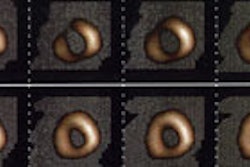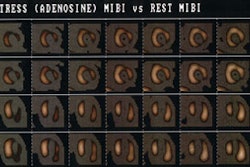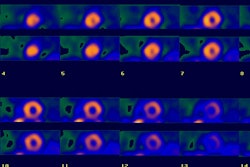J Nucl Med 2001 Jul;42(7):1011-6
Reappearance of cardiac presynaptic sympathetic nerve terminals in the
transplanted heart: correlation between pet using (11)c-hydroxyephedrine and
invasively measured norepinephrine release.
Odaka K, von Scheidt W, Ziegler SI, Ueberfuhr P, Nekolla SG, Reichart B, Bengel
FM, Schwaiger M.
Previously, sympathetic reinnervation of the transplanted heart has been
described using invasive catheterization techniques and noninvasive radionuclide
imaging techniques. However, little is known about the agreement between these 2
methods. Thus, correlation between (11)C-hydroxyephedrine (HED) PET and
invasively measured norepinephrine (NE) release was investigated in transplant
recipients in this study. METHODS: Using PET and the catecholamine analog HED,
17 patients were studied between 2 mo and 13.6 y after transplantation. Based on
results in completely denervated hearts, areas with HED retention >7%/min
were defined as reinnervated. Additionally, transcardiac NE release induced by
intravenous tyramine (55 &mgr;g/kg) was measured by coronary sinus and
aortic catheterization within 1 wk of the PET study. NE levels between coronary
sinus and aortic root, DeltaNE(CS-AO), were calculated at baseline and after
tyramine administration. Differences of more than 3 SD of baseline (>163 pg/mL)
were interpreted as reinnervation. RESULTS: HED retention indicated
reinnervation in 10 patients. Maximal HED retention ranged from 4.3%/min to
16.4%/min. DeltaNE(CS-AO) 1 min after tyramine administration ranged between -10
pg/mL and 1157 pg/mL, and 8 patients were above the reinnervation threshold.
Fisher's exact test demonstrated good agreement between results of PET and
DeltaNE(CS-AO) measurements (P = 0.002). Maximal HED retention was also
significantly correlated with NE release (r = 0.69; P = 0.001). CONCLUSION:
Results of invasively measured NE release and noninvasive (11)C-HED PET are well
correlated. This study further supports the usefulness of PET as a noninvasive
approach for detection of reappearance of catecholamine uptake sites after heart
transplantation.



